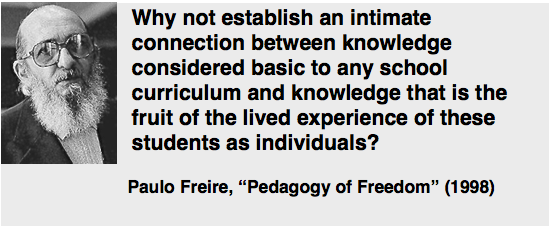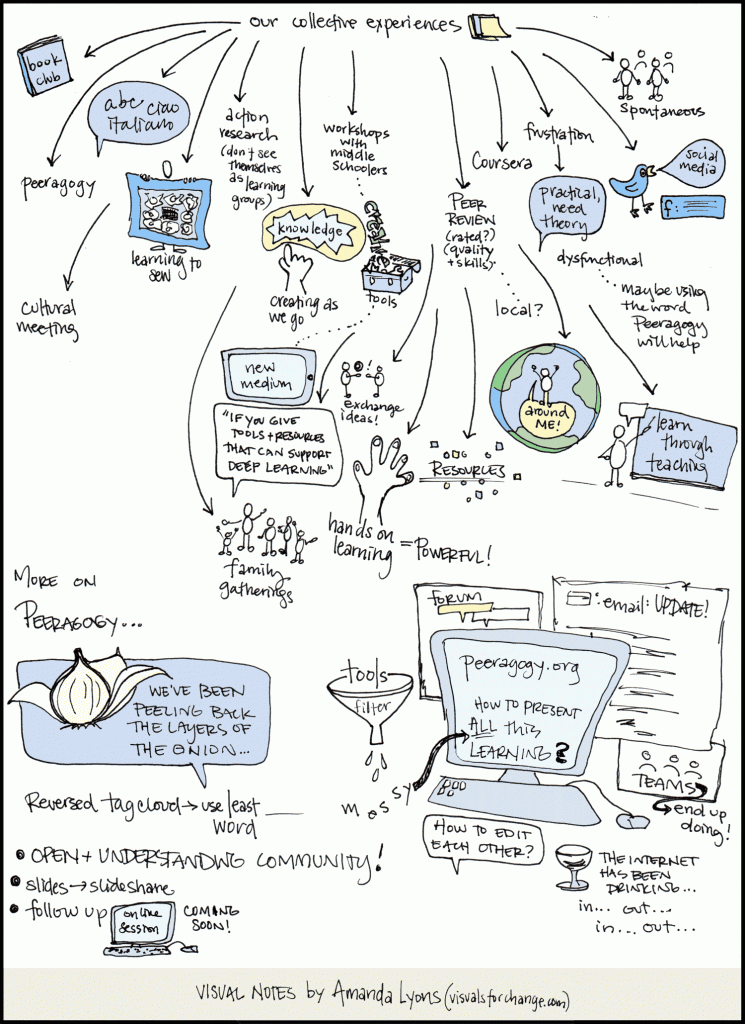There was once only one agogy and now there are many. Most educators are intimately familiar with pedagogy the art and science of educating and teaching children. Some are also familiar with andragogy the art and science of educating and teaching adults. Recently a few more agogies have surfaced so I thought it was high time to explore some of these new and emerging ideas. We’ll start with the already familiar just to warm up.
Pedagogy
Pedagogy literally means, to lead the child. Remember Piaget, Brunner, Vygotsky, oh my! Yes, these were the leading thinkers and doers in defining and popularizing the art, science and profession of teaching children.
Bloom’s Taxonomy developed as a way to actualize pedagogic principles and learning theory by scaffold learning up the ladder of recognizing, recalling, analyzing, reflecting, applying, evaluating and creating.
Pedagogy is not a learning theory. It is an approach to teaching.
There are a variety or pedagogical approaches that have developed to support a similarly large selection of learning theories and teaching philosophies. I know, nothing is simple!
Critical pedagogy
Critical pedagogy is concerned with democracy and freedom from oppression through consciousness raising.
Paulo Friere, considered by most to be the father of Critical Pedagogy, says,
Education either functions as an instrument that is used to facilitate the integration of the younger generation in to the logic of the present system and bring about conformity to it, or it becomes the practice of freedom the means by which men and women deal critically and creatively with reality and discover how to participate in the transformation of their world.
Andragogy
Andragogy to lead the man was originally used by Alexander Kapp and then further developed by Malcolm Knowles and it focuses on the art and practice of teaching adults. It’s based on the premise that:
- adults need to know why they need to learn something,
- adults need to learn experientially,
- adults approach learning as problem-solving, and
- adults learn best when the topic is of immediate value.
Many educators, including Knowles, now believe that learning, and therefore teaching practices, exist on a continuum from pedagogy to andragogy where pedagogy is more teacher-directed and andragogy is self-directed.
Check out this educational video on the difference between and Tom Whitbys excellent case for adopting the principles of andragogy for everyone, even kids.
Social pedagogy
Social pedagogy leans on social learning theory, where learning takes place on a societal level. In other words social learning occurs when individuals experience a demonstrable change in understanding or behaviour through social interactions and that change extends to include the society in which they live.
This idea has not caught on as a pedagogy per se in North America as much as it has in Europe. Despite it’s not being used formally as a learning theory and teaching approach we experience it all the time. Social media, especially Twitter chats and online communities appear to be using Social Pedagogy.
In Europe, social pedagogy is described as,
more holistic and group-oriented than dominant forms of social work and schooling, social pedagogy (sozial pdagogik) has its roots in German progressive education and is sometimes translated as community education or education for sociality
According to Social Pedagogy UK, Johann Pestalozzi’s (1746Â 1827) Head, Heart, Hand approach is related to Social Pedagogy. I’m not seeing the connection but it’s such a cool resource I wanted to share it anyway. From my perspective it sounds like project based learning would fit in here.
He [Pestolozzi] wanted to establish a psychological method of instruction that was in line with the laws of human nature. As a result he placed a special emphasis on spontaneity and self-activity. Children should not be given ready-made answers but should arrive at answers themselves. To do this their own powers of seeing, judging and reasoning should be cultivated, their self-activity encouraged (Silber 1965: 140). The aim is to educate the whole child intellectual education is only part of a wider plan. He looked to balance, or keep in equilibrium, three elements hands, heart and head.
I’ve also written a bit about the Head, Heart and Hand approach to learning for adults and will re-post those here soon.
For more on Social Pedagogy check out Social Pedagogy UK and the Head, Heart and Hand?-?Education in the Spirit of Pestalozzi website.
Heutagogy
Heutagogy is the study of self-determined learning. Thank Stewart Hase and Chris Kenyon for the term. This agogy puts learners at the very centre of learning and is especially well suited to online learning environments and life-long learning practice. Like all the agogies, only the label is new. I suspect this is how people learned prior to the advent of formal education.
heutagogy looks to the future in which knowing how to learn will be a fundamental skill given the pace of innovation and the changing structure of communities and workplaces. (What is Heutagogy)
Find more at the Heutagogy Community of Practice
Peeragogy
Peeragogy comes courtesy of Howard Rheingold and is focused on the art and practice of co-learning with peers primarily with the help on online social networks. Howard invites us to use the Peeragogy Handbookwriting,
If you and a group of other people want to use digital media and networks to co-learn together, this handbook is a practical tool for learning how to self-organize peer learning what we call peeragogy.
There is a very active Google + community Peeragogy in Action that supports this concept and in their FAQ they say that Peeragogy refers to any sort of self-organized peer learning.
Related to, underlying, and overlapping all the ogogies you’ll find:
- Networked Learning (Illich’s learning webs, and more recently MOOCs)
- Collaborative Learning (spawned from social constructivism and related to project-based learning)
- Networks of Practice (NoP, John Seely Brown and Paul Duguid)
- Communities of Practice (CoP, Lave and Wenger)
- Personal Learning Environments (PLEs)
- Personal Learning Networks (PLNs)
- Connectivism (Siemens)
- Community as Curriculum (Rhizomatic education, Cormier)
And a host of others that I just can’t recall right now.
Communagogy
Ok, I made that up, just now. However, if we have a term to define the art and science of teaching or better stated, facilitating learning for children, adults, peers and societies shouldn’t we have one for community learning
Community learning is different from Peeragogy in that in a community, like a school community or within the non-profit housing sector, the diversity can be such that co-learners may not be peers. It also differs from social pedagogy in that it is not a completely open group.
Community learning could include youth, parents, teachers, business people, service end-users, government representatives, etc., who have local knowledge and investment in one particular thing.
Communagogy might be the art and science of facilitating learning within a stakeholder group – a group bounded by a common interest.
Perhaps this is what we can call the study of Communities and Networks of Practice. I dunno – do we really need yet another word?
Edited from original version published April 1, 2013 on the Thoughtexchange blog




Hi yes you have missed a few out and I am trying to find many more “agogy” theories.
Paragogy (different word for Peeragogy)
Technohuetagogy
Ubuntugogy